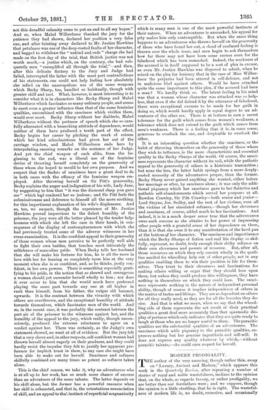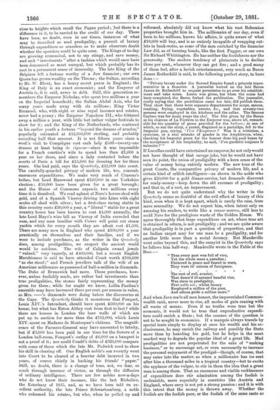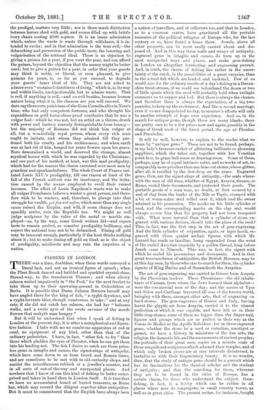MODERN PRODIGALITY. •
THE author of the very amusing, though rather thin, essay on "Luxury, Ancient and Modern," which appears this week in the Quarterly Review, after repeating a number of stories of royal and noble wastefulness, inclines to the opinion that, on the whole, as regards luxury, or rather prodigality, we are better than our forefathers were ; and we suppose, though the opinion is a little startling, that he is right. The wasteful- ness of modern life is, no doubt, excessive, and occasionally rises to heights which recall the Pagan period ; :bat there is a -difference in it, to be carried to the credit of our day. There have been, no doubt, even in our times, instances of what may be described as mad prodigality, a pursuit of luxury through expenditure so senseless as to make observers doubt whether the spenders could be quite sane. The Kings of to-day are growing economical, not to say stingy, and save money, and seek "investments" after a fashion which would once have been denounced as most unroyal, but which probably has its root in a permanent sense of insecurity. The late King of the Belgians left a fortune worthy of a Jew financier ; our own Queen has grown wealthy on the Throne ; the Sultan, according to Mr. W. Blunt, has a heavy secret purse in England ; the King of Italy is an -exact economist ; and the Emperor of Austria is, it is said, never in debt. Still, this generation re- members the Emperor Nicholas, who spent two millions a year on the Imperial household ; the Sultan Abdul Aziz, who for many years made away with six millions ; King Victor Emanuel, who, with eight or nine royal incomes and estates, never had a penny ; the Emperor Napoleon III., who frittered away a million a year, with little but rather vulgar festivals to show for it ; and the King of the Netherlands, who scattered in his earlier youth a fortune "beyond the dreams of avarice," popularly estimated at £12,000,000 sterling, and probably exceeding half that amount. It is not fifteen years since a week's visit to Compiegne cost each lady £500—twenty-one dresses at least being de rigueur—since it was impossible for a French courtier's wife to spend less than £1,000 a year on her dress, and since a lady contested before the courts of Paris a bill for £15,000 for dressing her for three years. She had paid, says the Quarterly, £12,000 into court. The carefully-guarded privacy of modern life, too, conceals enormous expenditures. We make very much of Crassas's bribes, but Lord Harewood spent £120,000 in one Yorkshire election ; £50,000 have been given for a great borough ; and the House of Commons expends two millions every time it is dissolved. We read aghast of Nero's horses shod with gold, and of a Spanish Viceroy driving into Lima with eight mules all shod with silver ; but a first-class racing stable in this country costs 230,000 a year, a " liberal " stable for a great country house has been known to cost £4,000 annually, the late Lord. Mayo's wine bill as Viceroy of India exceeded that sum, and any man familiar with Cowes will point out steam yachts which for every month they are afloat cost £1,500. There are many men in England who spend £100,000 a year practically on themselves and their families, and if we were to include purchases, as the writer in the Quarterly does, among prodigalities, we suspect the ancient world would be outdone. The wife of Caligula owned jewels "valued," very vaguely, at £400,000, but a recent English Marchioness is said to have attended Court worth £100,000 "as she stood ;" and French jewellers talk of the wife of an American millionaire as possessed of half-a-million in diamonds. The Duke of Brunswick had more. Those purchases, how- ever, unless foolishly made, are rather bad investments than true prodigalities, the stones fairly representing the money given for them ; while for aught we know, Lollia, Panlina's emeralds may have increased three per cent, per annum in value, as Mrs. —'s diamonds were doing before the discoveries at the Cape. The Quarterly thinks it monstrous that Fouquet, Louis XIV.'s Intendant, should have spent £360,000 on his house, but what has Eaton Abbey cost from first to last ? while there are houses in London the bare walls of which are put up to auction for more than the £112,000, which Louis XIV. spent on Madame de Montespan's chateau. The magnifi- cence of the Farmers-General may have amounted to fatuity, but if £3,000 has been paid in our time for the flowers of a London ball-room, Fonquet's outlay of £6,000 on a banquet is not a proof of it ; nor could Conde's debts of £320,000 compare with some of those which the late Mr. Padwick used to show his skill in clearing off. One English noble's son recently went into Court to be cleared of a heavier debt 'incurred in two years, of course chiefly in backing his friends' "paper." Still, no doubt, there is a change of tone, not, we fear, so much through increase of virtue, as through the diffusion of ordinary intelligence. There are few nobles now-a-days who do not know their incomes, like the last Richelieu, the Esterhazy of 1835, and, as we have been told on ex- cellent authority, the late Prince Schwartzenberg, a noble who redeemed his estates, but who, when he pulled up and
reformed, absolutely did not know what his vast Bohemian properties brought him in. The millionaire of our day, even if born to his millions, knows his affairs, is quite aware of what £10,000 will buy, and is as entirely incapable of wrapping cut- lets in bank-notes, as some of the men enriched by the financier Law did, as of burning bonds, like the first Fugger, or our own Sir Richard Whittington. He has neither the foolishness nor the generosity. The modern tendency of plutocrats is to decline three per cent., whenever they can get five ; and a good many of them feel, after a lavish entertainment, very much as Baron James Rothschild is said, in the following perfect story, to have done :—
"Private luxury under the Second Empire found a princely repre- sentative in a financier. A journalist waited on the late Baron James de Rothschild to request permission to go over his establish- ment and take notes. Leave was given, but when the notes had been completed, the Baron forbad the publication. The journalist, coolly saying that the prohibition came too late, did publish them. They show that there were separate departments for soups, sauces, roasting, frying, vegetables, sweets, (kc., and that seventy-two persons were employed in the kitchens and the cellar. The famous Careme was for many years the chef. The fete given by the Baron at his chateau of La Ferriere to the Emperor was, above all, remark- able for the quantity of game provided for the battues ; at one of which, so ran the story, a parrot, disguised as a partridge, fell to the Imperial gun, crying, Five l'Empereur P Was it a witticism, a cynicism, or a real mistake of gender in the Amphitryon, when, thanking his Imperial guest for the honour done hi 4 poor house by the acceptance of his hospitality, he said, 'J'en garderai touj ours /a memoire P'"
If Lucullas could have entertained an emperor,he not onlywould not have thought of that savage joke, but he would not have seen its point, the union of prodigality with a keen sense of the value of money being entirely modern. The new tone of the great Courts, the comparative privacy of modern life, and a certain kind of selfish intelligence—as shown in the noble who gives 220,000 for a gold dinner-service, but demands discount for ready-money—keep down the old excesses of prodigality ; and that is, of a sort, an improvement.
But we do not quite understand why the writer in the Quarterly seems so doubtful of the evil effect of luxury of this kind, even when it is kept apart, which is rarely the case, from mere sensuality. We do not expect him, when intent only on amusing his readers, to write like a censor morwm, still less to scold Nero for the prodigious waste of the Golden House. We agree thoroughly that large expenditure on art, where true art is obtained in return, is not prodigality ; and we are quite aware that prodigality is in part a question of proportion, and that an Indian carpet may for one man be a prodigality, and for another little more than a social decency. But Mandeville went miles beyond this, and the essayist in the Quarterly says he follows him half-way. Mandeville wrote in the Fable of the
Bees :—
"Thus every part was fall of vice, Yet the whole mass a paradise ; Flattered in peace and feared in wars, They were th' esteem of foreigners. •
The root of evil, avarice, That damn'd ill-natured baneful vice, Was slave to prodigality,
That noble sin ; whilst luxury Employed a million of the poor, And odious pride a million more."
And when Jove ma‘le all men honest, the impoverished Common- wealth sank, never more to rise, all modes of gain ceasing with all waste of means. Even if no truths were true but the economic, it would not be true that unproductive expendi- ture could enrich a State ; but the essence of the question is not to be sought in economics. If a marquis always travels by special train simply to display at once his wealth and his ex- clusiveness, he may enrich the railway and possibly the State more than by hoarding his gold, but he helps in the most marked way to degrade the popular ideal of a great life. Mad prodigalities are not perpetrated for the sake of "making business," or to encourage art, or even necessarily to increase the personal enjoyment of the prodigal—though, of course, that may enter into the matter, as when a millionaire has ice sent after him a thousand miles in a tropical country—but to excite the applause of the vulgar, to stir in them the idea that a great man is among them. That an enormous and visible recklessness of expenditure does stir admiration among the foolish is undeniable, more especially in countries like Austria and England, where envy is not yet a strong passion ; and it is with this intent that the money is thrown away. Whether the foolish are the foolish poor, or the foolish of the same caste as
the prodigal, matters very little ; nor is there much distinction between horses shod with gold, and rooms filled up with brittle ivory chairs costing 2500 a-piece. It is an inane admiration which, unless the waste is waste through wilfulness, it is in- tended to excite ; and in that admiration is the true evil,—the debauching and perversion of the public taste, the lowering and vulgarisation of the national ideal. There is no objection to giving a guinea for a pear, if you want the pear, and can afford the guinea, beyond the objection that the money might be better used ; bat to give a guinea for a pear, in order that your guests may think it noble, or liberal, or even pleasant, to give guineas for pears, is, so far as you succeed, to degrade your guests' inner ideal of life. They are not asked to admire even "sustained stateliness of living," which is, in its way and within limits, unobjectionable, but to admire waste. That is evil, if anything is evil,—and an evil besides, because human nature being what it is, the chances are you will succeed. We dare say there were patricians of the Gens Cornelia alive in Nero's time, who had only competent fortunes, and who thought his expenditure on gold horse-shoes proof conclusive that be was a vulgar fool—which he was not, but au artist on a throne, drunk with power and fantasy scarcely distinguishable from lunacy— but the majority of Romans did not think him vulgar at all, but a wonderfully royal person, whom every rich man ought to imitate, and whom they admired till they par- doned both his cruelty and his recklessness ; and when earth was at last rid of him, heaped for years flowers upon his grave. Nero demoralised a world, and deserved the strange, almost mystical horror with which he was regarded by the Christians ; and one part of his method, at least, was this mad prodigality, which had for the masses the charm exercised over most men by grandeur and openhandedness. The whole Court of France imi- tated Louis XIV.'s prodigality, till one reason at least of the fall of the French noblesst was its insolvency, and the irrita- tion caused by the means employed to swell their ruined incomes. The effect of Louis Napoleon's waste was to make all vulgar Frenchmen believe a waster a great person, and there- fore wish to be wasters, and, therefore, to plunge into that struggle for wealth, per foe aut nefas, which more than any single cause ruined the Empire, and will, if some change does not speedily arrive, ruin the Republic too. We might as well judge sculpture by the value of the metal or marble em- ployed—as, by the way, some Greek writers did—and expect taste to remain perfect, as consider prodigality brilliancy, and expect the national tone not to be debauched. Dining off gold may be innocent enough, particularly if the host thinks nothing about it ; but to make dining off gold an ideal, as is the object of prodigality, misdirects and may ruin the impulses of a nation.




































 Previous page
Previous page